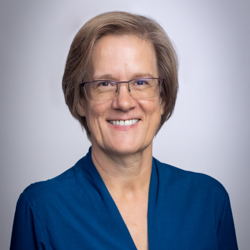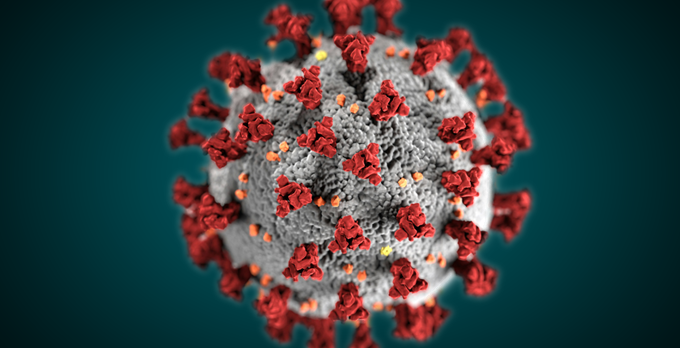In a notable moment for The University of New Mexico, Michelle Harkins, MD, Professor of Medicine in UNM’s School of Medicine’s Internal Medicine played a key role in the U.S. Senate Health, Education, Labor and Pensions (HELP) Committee hearing focused on "Addressing Long COVID: Advancing Research and Improving Patient Care."
The hearing, held on Thursday, Jan. 18, provided a crucial platform for experts like Harkins to contribute insights into the challenges posed by Long COVID and discuss potential avenues for advancing research and enhancing patient care.
I know we all want answers yesterday because patients are suffering. Long COVID is really complex, and as my colleagues have mentioned it affects every organ system – all the different cells are involved – and so trying to come up with a one-size fits all (approach) is not going to work.
Harkins, a distinguished authority in pulmonary medicine and a respected member of the UNM faculty, was invited to share her expertise on the impact of Long COVID on patients, emphasizing the physical and mental health aspects. Her participation underscored the university's commitment to contributing to national conversations about the lasting impacts of COVID-19.
The hearing began with the testimony of two Long COVID patients, and a mother representing her 16-year-old daughter, who was diagnosed with Long COVID two years ago. The painful realities experienced by these patients and their families set the stage for the subsequent panel of medical experts, humanizing their collective calls for more support and more funding from the federal government.
During her testimony, Harkins highlighted the need for comprehensive research efforts to better understand the effects of Long COVID and its impact on individuals' quality of life. She also addressed the importance of developing effective strategies for patient care and support, considering the unique challenges presented by this complex condition.
“I know we all want answers yesterday because patients are suffering,” Harkins said. “Long COVID is really complex, and as my colleagues have mentioned it affects every organ system – all the different cells are involved – and so trying to come up with a one-size fits all (approach) is not going to work.”
In spite of these complexities, Harkins assured the committee there is hope to be found.
“We are finding answers, we are finding trends, we are clustering patients into different subgroups...” Harkins said. “What we do with that information is critical in what we can do to improve patient symptoms and educate providers so that patients are heard and felt like they have a partner in this diagnosis.”
In the early days of the COVID –19 pandemic, Harkins worked closely with UNM’s Project ECHO, leader of the ECHO model, an innovative method of creating virtual communities of practice to help accelerate peer‐to‐peer knowledge within a trusted community. A virtual ECHO network was established to support the hundreds of health care providers across the state who were struggling to treat critically ill Covid‐19 patients in their hospitals and clinics.
“When the initial waves of the pandemic slowed,” Harkins said, “we then set up a parallel program for primary care providers struggling to identify and treat Long Covid patients, which was funded by the Health Resources and Services Administration (HRSA) Telehealth Technology‐Enabled Learning Program (TTELP) initiative. Through this program, my team and I have helped train over 800 local providers across the United States on how best to identify and support patients with Long Covid.”
Harkins made several recommendations to the committee for how the federal government can support both patients and providers who are grappling with this new and often debilitating condition. Her recommendations included continued funding for research on Long COVID, a research network rooted in transparency to share data on all levels (public health, community, federal and state), help preventing the occurrence of Long COVID in the future, supporting clinicians nationwide to ensure access to the most up‐to‐date best practices in trusted communities, and making access to clinical care easier for patients.
“Very few Long COVID clinics exist nationwide. If they do exist, they are in bigger academic centers in big cities,” Harkins said. “In New Mexico, for example, we have one Long COVID clinic at UNM run by my Project ECHO co‐medical director, Dr. Alisha Parada, a general internist. What we need are multidisciplinary clinics to address the myriad of symptom complexes that these patients face. We need a pulmonologist, a cardiologist, a neurologist or psychologist, physical therapy, occupational and speech therapy, and social workers to be in one location, so patients can be seen by whomever they need.”
The patients and mother of a patient who testified at the hearing echoed these sentiments. They shared challenges with waiting six to nine months to meet with health care providers, driving themselves long distances to appointments while sick, and being met with everything from disbelief to outright dismissal of their symptoms. Angela Meriquez Vázquez, MSW, a Long COVID patient from Los Angeles, CA responded to Senator Ed Markey’s (D-MA) question about simplifying the bureaucracy that inhibits access to patient care while also responding to the “strong public demand” to protect against fraud.
“I will say that the threat and fear of fraud is probably much smaller in reality,” Vázquez said. “Nobody wants to be sick, nobody wants to be disabled in an ableist society, so presumptive eligibility would be a huge start for both disability benefits as well as clinical services and community-based services, because there's just such a broad population of folks who are living with this (Long COVID).”
One solution Harkins offered regarding access to patient care is rooted in the telemonitoring system that already exists for health care providers, with a great deal of success: Project ECHO. She also noted the telemonitoring system’s usefulness in preparing for the inevitable next pandemic, which, whether it’s 10 or 30 years from now, experts know is coming.
“Expanded investment in the development of a national network for telementoring would make a huge difference,” Harkins said. “This national network of local providers and regional and national experts, once created, would then be available to help respond to the next pandemic or health emergency as it arises. This is telementoring for providers, but in theory this model could be created as regional Long COVID Clinics where the experts actually consult with the patients.”
As the nation continues to grapple with the aftermath of the COVID-19 pandemic, the insights shared by Harkins at the HELP Senate Committee hearing serve as a testament to the vital role universities play in addressing and finding solutions to COVID-19, Long COVID, and other complex healthcare challenges.
You can watch the full Senate HELP Committee hearing on their website and review a transcript of Dr. Harkins’ initial testimony here.
For more information about the University of New Mexico's ongoing contributions to health care research, please visit: hsc.unm.edu/news/research/